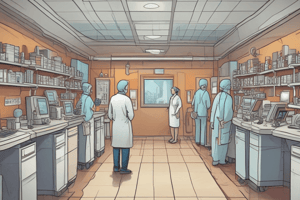Podcast
Questions and Answers
What is defined as the third leading cause of death in the USA?
What is defined as the third leading cause of death in the USA?
- Cancer
- Heart disease
- Accidents
- Medical errors (correct)
Which of the following is NOT one of the TJC 2024 National Patient Safety Goals for hospitals?
Which of the following is NOT one of the TJC 2024 National Patient Safety Goals for hospitals?
- Identify patients correctly
- Prevent mistakes in surgery
- Increase patient waiting times (correct)
- Improve staff communications
What is one of the recommended practices for infection control?
What is one of the recommended practices for infection control?
- Using less disinfectant
- Skipping equipment sterilization
- Hand hygiene (correct)
- Increasing visitor access
Which QSEN competency focuses on minimizing harm through systemic effectiveness?
Which QSEN competency focuses on minimizing harm through systemic effectiveness?
What should be included in emergency preparedness to avoid failures in safety?
What should be included in emergency preparedness to avoid failures in safety?
Which practice is included under medication safety protocols?
Which practice is included under medication safety protocols?
What does failure to rescue refer to in healthcare?
What does failure to rescue refer to in healthcare?
Which QSEN competency emphasizes the importance of teamwork in care?
Which QSEN competency emphasizes the importance of teamwork in care?
What is the primary goal of activating the fire code in a healthcare setting?
What is the primary goal of activating the fire code in a healthcare setting?
Which type of medication error involves prescribing a medication that is not necessary?
Which type of medication error involves prescribing a medication that is not necessary?
What annual financial impact do medication errors have on U.S. hospitals?
What annual financial impact do medication errors have on U.S. hospitals?
Which of the following was identified as the most common nursing student medication error?
Which of the following was identified as the most common nursing student medication error?
What is the recommended way to overcome barriers to medication safety in nursing?
What is the recommended way to overcome barriers to medication safety in nursing?
In the context of emergency preparedness, which action should follow the activation of the fire code?
In the context of emergency preparedness, which action should follow the activation of the fire code?
Which type of medication error occurs when a drug is not taken by the patient?
Which type of medication error occurs when a drug is not taken by the patient?
What does a 'near miss' in a healthcare context refer to?
What does a 'near miss' in a healthcare context refer to?
What demographic factor significantly increases fall risk among older adults?
What demographic factor significantly increases fall risk among older adults?
Which of the following is considered a risk factor for falls?
Which of the following is considered a risk factor for falls?
Which fall prevention intervention involves keeping essential items accessible to the patient?
Which fall prevention intervention involves keeping essential items accessible to the patient?
What was the reduction in overall inpatient falls observed in the study of a patient-centered fall-prevention tool kit?
What was the reduction in overall inpatient falls observed in the study of a patient-centered fall-prevention tool kit?
How much does the annual cost of falls amount to?
How much does the annual cost of falls amount to?
Which of these interventions is recommended to enhance fall prevention measures?
Which of these interventions is recommended to enhance fall prevention measures?
What percentage reduction in fall injuries was reported from the implementation of the fall-prevention tool kit?
What percentage reduction in fall injuries was reported from the implementation of the fall-prevention tool kit?
Which of the following factors does NOT contribute to fall risk?
Which of the following factors does NOT contribute to fall risk?
Flashcards are hidden until you start studying
Study Notes
Medical Errors & Safety
- Medical errors annually result in between 210,000 - 440,000 patient deaths and are the third leading cause of death in the USA.
- Cost of $20 Billion dollars/year in the US.
- Healthcare failures contributing to safety lapses include failure to recognize, failure to rescue, and failure to plan.
QSEN Competencies
- The QSEN competencies include:
- Patient-Centered Care
- Teamwork & Collaboration
- Evidence Based Practice
- Quality Improvement
- Safety
- Informatics
QSEN defines Safety as:
- Minimizing risk of harm to patients and providers through both system effectiveness and individual performance.
TJC 2024 National Patient Safety Goals for Hospitals
- Identify patients correctly
- Improve staff communications
- Use medications safely
- Label Medications
- Medication Reconciliation
- Use alarms safely
- Prevent Infection
- Hand hygiene
- Identify Patient Safety Risks
- Prevent Mistakes in Surgery
Fire Safety - RACE
- Rescue anyone in immediate danger.
- Activate the fire code and notify appropriate person.
- Confine the fire by closing doors and windows.
- Evacuate patients and other people to a safe area.
The BIG 3 in Safety Errors: Medication Errors
- Medication errors are the most common safety errors.
- Medication errors occur at any point in the medication use process.
- 1.2 million patients are harmed each year by medical errors made in US hospitals.
- Over $40 Billion annually goes toward treating the consequences of medication errors.
- Computerized medication ordering systems can prevent 84% of dose, frequency, and route errors.
Types of Medication Errors
- Omission: Drug not prescribed, dispensed, or administered.
- Commission:
- Wrong drug, dose, or route
- Wrong patient
- Frequency, timing, or duration of the drug is incorrect
- Allergic reaction
- Drug interaction
Nursing Student Medication Errors
- A systematic review of 1904 nursing student medication errors found:
- Majority of errors were wrong dose (17%).
- Other common errors: Omission (16%), Wrong time (13%).
Student Barriers to Building a Safer Culture
- Lack of acceptance of corrective feedback.
- Near misses (no harm to patient) often lack learning opportunities.
The BIG 3 in Safety Errors: Falls
- Falls are considered a "never event" in healthcare.
Fall Demographics
- Females are more likely to fall than males.
- Fall risk increases with age, especially over age 65.
- Over 2.8 million older people are treated in the ED for fall injuries each year.
- 800,000 patients a year are hospitalized after falls.
- Falls result in 27,000 deaths annually.
- Those over 75 years of age who fall are 4-5 times more likely to be admitted to an ECF.
- 50% of people over 75 years old who fall will die within 1 year.
- Cost of falls: $31 Billion Annually.
Falls Risk Factors
- 65 years old or older
- History of falls
- Cognitive impairment
- Altered gait
- Medications
- Incontinence
- Unsafe environment
- Sensory deficits
- Orthostatic hypotension
- Depression
- Assistive devices
- Confusion or disorientation
- New environment
Fall Prevention Interventions
- Complete fall assessments
- Frequent rounding
- Place on fall precautions
- Offer assistance to the toilet Q2
- Treaded socks
- Bed in low position and bed alarms ON
- Personal items within reach
- Call light within reach/Answer call lights promptly
Evaluation of a Patient-Centered Fall-Prevention Tool Kit
- A nonrandomized controlled trial of a patient-specific fall-prevention tool kit was associated with:
- 15% reduction in overall inpatient falls.
- 34% reduction in fall injuries.
Studying That Suits You
Use AI to generate personalized quizzes and flashcards to suit your learning preferences.




